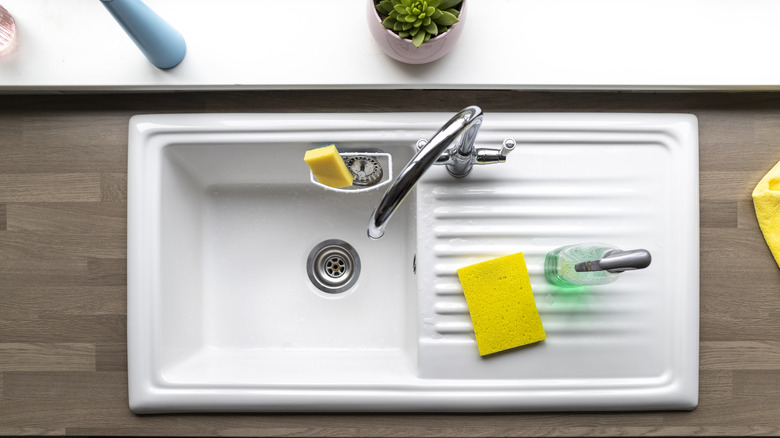This Fragrant Essential Oil May Be The Secret To The Cleanest Sink Ever
Essential oils are a wonderful solution to freshen up any room in your home. Having a book of scents to choose from allows you to match an aroma to your space or mood for diffusing. Additionally, essential oils can add your favorite smell to your DIY cleaning products, providing a great alternative to the chemical smells associated with commercial products. One scent in particular, tea tree, has beneficial cleaning powers that will help you freshen up any dirty or smelly sinks in your home.
Tea tree oil is a popular choice for cleaning and is a natural essential oil derived from the leaves of the tea tree plant, native to Australia. Tea tree oil has natural antibacterial properties that effectively kill germs and bacteria. This makes it an excellent choice for cleaning and disinfecting surfaces, including sinks, countertops, and bathroom fixtures. Studies have also found tea tree oil to possess antifungal properties, combating mold and mildew in areas prone to moisture, such as bathrooms and kitchens. Finally, tea tree oil has a fresh and invigorating scent that can help eliminate unpleasant odors. It offers an earthy scent, like sage or eucalyptus, but more subtle than the latter.
Using tea tree oil in DIY cleaning solutions has advantages over buying commercial ones. Many commercial cleaners contain harsh chemicals that can be harmful to both our health and the environment. Tea tree oil provides a natural alternative, free from synthetic chemicals, making it safer to use around children and those with sensitivities.
How to use tea tree oil to freshen up your sink
Tea tree oil is a versatile and natural essential oil that can be used for various cleaning purposes, including freshening up your sink. When used properly, tea tree oil can effectively clean and disinfect your sink, leaving it smelling fresh and looking sparkling clean. To do so, start by preparing a cleaning solution. Fill a spray bottle with 2 cups of hot water, 1 ½ cups of vinegar, and 10 drops of tea tree oil. Shake the bottle well to mix the solution.
Spray the tea tree oil solution onto the surface of your sink basin, making sure to cover all areas. Let it sit for a few minutes to allow the tea tree oil to work its magic. Then use a soft cloth or sponge to scrub the sink basin gently. Pay extra attention to any areas with stains or grime. The tea tree oil will help break down dirt and grime, making it easier to remove.
If you have stubborn stains or odors in your sink drain, you can also use tea tree oil to freshen it up. Mix a few drops of tea tree oil with baking soda to form a paste. Apply the paste to the drain and let it sit for a few minutes. Then, use a brush or cloth to scrub the drain and rinse it thoroughly with water. Finally, rinse the sink basin with clean water to remove any residue.
When this may not be the best solution
While a DIY cleaning spray with tea tree oil is praised for its eco-friendly and mild disinfectant qualities, there are instances where it may prove ineffective. In cases where mold and mildew growth are severe, the DIY natural cleaner may not suffice. While tea tree oil possesses antifungal properties, its concentration in a homemade mixture might not eradicate deeply embedded mold or mildew. In situations where mold and mildew are persistent, a specialized mold and mildew cleaner with fungicidal ingredients, such as hydrogen peroxide or ammonia compounds, might be more suitable. Moreover, severe mold infections can be detrimental to your health and may require a consultation with a professional to safely remove it from your bathroom.
Another scenario where a DIY tea tree oil cleaner may not be a good choice is if the sink in need of cleaning is frequented by curious pets. Tea tree oil can be toxic to pets due to its high concentration of terpenes, according to the ASPCA. When ingested or topically applied, these compounds can harm animals. Even small amounts of undiluted tea tree oil, often found in household products or DIY solutions, can lead to symptoms such as drooling, vomiting, lethargy, and, in severe cases, tremors or even coma. Cats are particularly sensitive to tea tree oil toxicity. Ingesting or licking concentrated tea tree oil from surfaces can result in rapid absorption and adverse effects, so consider alternative options for your furry friends.


